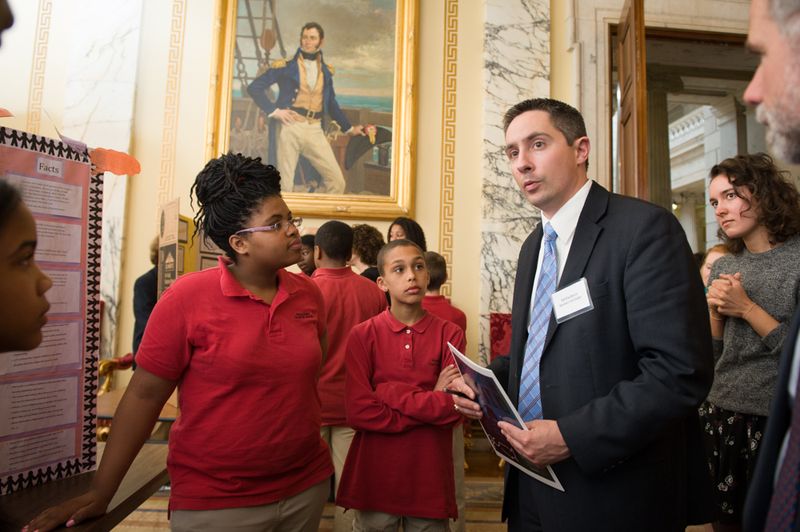
Generation Citizen: Young people matter
Generation Citizen promotes civic engagement by educating students on how they can work with local leaders to solve community problems. Scott Warren is a co-founder and executive director.
Ed Pacheco, a former Rhode Island state representative and a candidate for secretary of state, talks with students from Highlander Charter School at Generation Citizen’s 2013 Spring Civics Day. Photo Credit: Generation Citizen
By Scott Warren
Related link: “Generation Citizen to expand its youth civic action program with $190,000 from Knight Foundation“ press release dated July 10.
Since Generation Citizen was founded about four years ago, we’ve come a long way in our mission of educating young people to be informed, engaged and effective citizens. Now, with a $190,000 grant from Knight Foundation, we’re going to expand our work into Knight’s communities.
It’s a chance for college students to work with high school kids to help them identify issues they are passionate about. It’s a relationship that will change the lives of all those involved. We’ve already seen the evidence in the cities where Generation Citizen is at work.
We’ve educated more than 10,000 people in Boston, New York and Providence, R.I., trained over 250 college students (we call them democracy coaches) to help teach the curriculum, and received some extremely helpful support along the way. Most important, the students we work with in grades eight through 12 have accomplished concrete local change: getting a teen center built in Malden, Mass.; introducing legislation on public safety in Providence; and establishing official liaisons between police departments and schools in New York.
Along the way, however, our team has sometimes struggled to get the core of what we do into the limelight. We enable students to have a hands-on experience in community engagement. It’s civics education, which may bring to mind a boring class in school where students learn about the three branches of government and then take a test.
Generation Citizen changes this dynamic. Our students learn about the political process by participating in it. They tackle issues in their local communities that affect them every day, issues like gang violence, teen jobs and public transit. Then they learn about democracy through its messy mechanics: They mobilize others, attract media attention and engage elected officials. We call this “action civics.”
It’s been tough, though, to convince people that this approach makes a difference. Many can’t see that educating people younger than voting age about how our political process works will improve our democracy.
That’s why we’re grateful to receive this support from Knight Foundation. It’s our largest one-time grant ever, and it will strengthen Generation Citizen. We’re going to partner with the Center for Information and Research on Civic Learning and Engagement to evaluate what we do and demonstrate that action civics works. That assessment will help improve our curriculum and provide the foundation for online tools that can be used across the country. It has the potential to resonate in classrooms across the country.
However, Generation Citizen’s work will not be complete by working with every young person in the country; that’s unrealistic. It will only be successful if we help to expand what we feel is a burgeoning action civics space. Organizations like the Mikva Challenge, Earth Force, Youth on Board and the University Community Collaborative of Philadelphia, all part of a new partnership coined the National Action Civics Collaborative, are building the field. We hope support from Knight will help show the rest of the funding community, as well as the larger educational space, that action civics matters.
With all that’s going on in our country, we remain optimistic about the future. It’s impossible not to be after having a conversation with Oscar Giron, an 11th grade student in Providence, who almost single-handedly was responsible for getting new public safety legislation introduced, and testified in favor of it. As Oscar said, “I have personally met with Councilman David Salvatore, and my whole class met with State Representative Anastasia Williams. Now I understand what it takes to make an issue turn into a solution.”
We’re hoping to educate a lot more students like Oscar, people who understand what it takes to confront an issue, follow it through, and produce a result that improves the community.
Scott Warren, co-founder and executive director of Generation Citizen
Recent Content
-
Community Impactarticle ·
-
Community Impactarticle ·
-
Community Impactarticle ·


